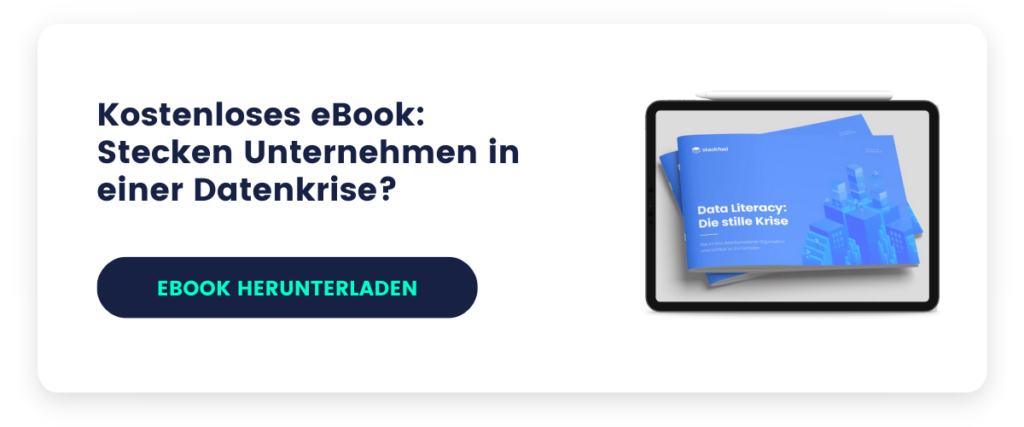At the latest since the federal government announced its Data Strategy published at the end of January 2021, the word Data Literacy is also on everyone's lips in this country. On the way to a dazzling, digital future, innovative and responsible handling of data, the Data literacy to General education raised. This is a challenge for many companies. Although companies have long understood the value of data, many employees in particular are unclear about how to deal with it - not least because companies have so far given them little support in their data skills. Or they still think that data skills are only for experts. But data literacy should be open to everyone.
In this article, we'll clarify the definition of data literacy, what it means for society and especially for businesses, and what steps will help you become data literate.
The meaning behind the data literacy definition?
Data skills, data awareness, data literacy: data literacy is the buzzword of the hour, but what's behind the term and why is it increasingly on many companies' training schedules? Translates one Literacy directly from English, it means Literacy, i.e., the ability to write and read. And this already shows the urgency of the topic. Someone who is not able to read and write is predominantly excluded from participation in our society. Those who lack data literacy are at a disadvantage in our digitized world, where data is constantly being generated.

In summary, data literacy is the ability to read, work with, analyze, and communicate data. As simple as this may sound in theory, it nevertheless presents most people with major challenges in practice.
Everyone in our society is directly affected by decisions that are made on the basis of data and that influence our lives. However, data alone often does not allow us to draw clear conclusions. Data literacy can help us to critically examine and analyze data. Because if data is evaluated correctly or communicated in a comprehensible way, it can bring considerable benefits.
While data literacy used to be something that only IT departments had to deal with, it has now changed from a specialist skill into an indispensable basic competence. "Big data, artificial intelligence and the Internet of Things are already part of our lives, not just our professional lives," explained Volker Meyer-Guckel, deputy secretary general of the Stifterverband. Data Literacy Charter published in January 2021, in an interview with the Handelsblatt. According to the charter, data literacy means possessing the necessary judgment to be able to collect, process, manage, evaluate and thus transform data into knowledge. Accordingly, everyone should be able to examine their handling of data in response to the following questions:
- What will I do with the data? (define concrete use for the data collection)
- What can I do with the data? (determine technical and methodological possibilities and limits)
- What may I do with the data? (Include data protection, copyright and other legal frameworks).
- What should I do with the data? (Data is a valuable resource that must be handled responsibly and should add value. Not everything that data protection allows has positive effects).
This makes data literacy THE key competence for systematically transforming data into knowledge and insights and for being capable of action and self-determination in our digitized world. It is an indispensable component of basic digital education and thus a core competence - not of the future, but of the present. The charter results in the following Guiding Principles:
- Data literacy must be accessible to all.
- Data literacy must be taught throughout life in all educational settings.
- Data literacy must be taught as a transdisciplinary competence from three perspectives. [The application-related (What is to be done?), the technical-methodical (How is it to be done?) and the social-cultural (What is it to be done for?)].
- Data literacy must systematically cover the entire process of insight and decision making with data.
- Data literacy must include knowledge, skills, and values for conscious and ethical use of data.
Data literacy as a precursor for digitization
The very first guiding principle, "Data literacy must be accessible to everyone," makes it clear that data literacy is not just indispensable for academics or only for the IT department, but that everyone must learn and master how to deal with data. However, there is no need to apply a watering-can principle here. The extent depends on the particular department, but it is nevertheless crucial that every department and every employee from customer service to IT is "literate".
Just as not everyone who can read and write well will necessarily become a novelist, it is still important for everyone to master the ABCs. Even if only a few people will ever write their own book, the literacy rate in Germany is 99.9 percent. The data literacy rate is likely to be far below the rate of people who come into contact with data professionally. The novelty of the topic should therefore not obscure its urgency. The basic competence of dealing with data must not be a privilege, but must be acquired by everyone. Targeted support is the key here. As we produce and consume lots of data every day, professionally and privately, the urgency for society-wide education increases.
It is important to promote this understanding in our society and our working world, which are increasingly influenced by Big Data and artificial intelligence. Most recently, the introduction of the GDPR in 2019 had shown how many professions come into contact with data and that the correct handling of data in companies had to be learned. The Corona pandemic has only further fueled the topic of digitalization and exposed societal failures. Data is now generated, collected, processed and analyzed everywhere. This already offers potential for momentous manipulation, intentional and unintentional. Anyone who does not understand what data is stored, how and for what purpose, and what conclusions it allows, could soon be left behind professionally.

The crux of gut feeling: Lack of data competence leads to excessive demands and absenteeism
A large number of companies have now recognized the added value that lies in the active and effective use of data. But as the use and processing of a company's data increases, the competence of its employees does not automatically rise. A study by Accenture from 2020 showed that only one in four feels adequately prepared to use data. The remaining 74 percent feel overwhelmed when working with data. There is an urgent need for action here, because this excessive demand can have a direct impact on corporate goals.
A company working on a digitization strategy must involve its employees. This applies to both existing and new employees. A supplementary study by the Data Literacy Project (DLP) showed that about a quarter of the study participants said they were adequately prepared for effective data use when they started their current job. 60 percent of respondents preferred to let their gut instinct guide their business decisions rather than base them on concrete data, despite the fact that 87 percent consider data to be critical to success in their jobs. No modern company can afford this discrepancy if it wants to survive in the market the day after tomorrow.
It is therefore not surprising that one in three avoid working with data and that around 31 percent have even called in sick at some point because of IT, data and information problems. This percentage may sound high, but it is only a consequence of the fact that 9 out of 10 executives feel inundated by data. Some feel fundamentally overwhelmed and capitulate. Hardly anyone wants to voluntarily bare his or her head in front of colleagues and employees and admit to a lack of competence. As a result, absenteeism and poor business decisions increase. If companies fail to train their employees in the necessary data skills, these figures will rise sharply as the use and processing of data increases in this decade. No industry will be exempt from this.
Must-have for the Roadmap 2021: Establishing Data Literacy in the Enterprise
Data is a relatively young industrial sector. It is therefore not surprising that the topic of data literacy or data awareness has fallen by the wayside in many companies in the past. Until now, the topic could be ignored quite painlessly. This is now changing. Because like diseases that are initially painless, a lack of data literacy can cause damage at an early stage, even if many companies are not yet aware of it.
The influence of data technologies is now too significant to be suppressed any longer. Whereas in the past it was only necessary to be blind in one eye, many companies now run the risk of flying into their economic future completely blind. Those who put their data literacy on the back burner are threatening their own existence. Data literacy is not a "nice-to-have" skill and must not be seen as an optional qualification. This is especially true in the world of work. Many companies are now asking themselves how this data literacy can be implemented in concrete terms. To do this, you should be able to answer the following questions:
- Which digital skills do you need as a whole company?
- Which department has which Need for further training?
- Where finds Data literacy in the training plan of your company take place?
- How do you anchor digital skills and data skills in their Corporate culture or their values?
A first step in this direction can be a survey. Find out which departments and which employees work intensively with data and how confidently the competent handling of data is already practiced. Make sure that the Dunning-Kruger effect does not come into play here. Because it's easy to overestimate your own abilities and the abilities of others.
DLP's study also found that 37 percent of participants believe that data literacy training or continuing education would increase their data literacy and thus their productivity. This means that it is now up to companies, L&D managers and executives to promote the data literacy of their employees.
The good news is that the results of a Splunk and Enterprise Strategy Group (ESG) Survey prove that an adapted data strategy has a positive impact on sales, operating costs and customer satisfaction. Last but not least, this strategy includes training the company's own workforce. Investments in training are therefore profitable in many respects. Companies that survey the individual training needs of their departments and employees have the advantage of being able to target training. Not every employee needs to be trained as a data expert. But there must be a Enlightenment space where employees learn how to deal with data in a fundamental and responsible way, how to analyze it correctly, and what conclusions it allows them to draw. The most important point here is that employees should be given a Trust in data to be able to make business decisions based on data. In this way, educating employees makes a significant contribution to the continued success of the business.
Therefore rely on effective trainings and train your employees in it:
- Read data
- Work independently with data
- Analyze data and derive forecasts
- Assess risks
- Communicate results in a professional and understandable manner
- Make data-driven decisions.
We are happy to help you with this. Our trainings are designed for employees who are familiar with the topic of Data Analytics gain a better understanding, perform perspective-based simple analyses independently, or collaborate with data experts in a hands-on manner. Our extra-occupational online training consist of instructional videos, expert interviews, text content, and interactive assignments as well as business scenarios to practically apply and reinforce what has been learned. Our Mentoring Team mentors you throughout the training to help you achieve the data literacy you need to succeed in a digital workplace today and in the future.
Inform yourself here about our training offers and make a free consultation appointment with us.
Forbes (2018): "Why All Employees Need Data Skills In 2019 (And Beyond)" [08.02.2021]
Gartner (2018): "Citizen Data Scientists and Why They Matter." [08.02.2021]
Forbes (2017): "What Is Data Democratization? A Super Simple Explanation And The Key Pros And Cons" [08.02.2021]
The Data Literacy Project (2021): "The Data Literacy Project. [05.02.2021]
Stifterverband (2021): "DATA-LITERACY-CHARTER" [03.02.2021]
Industry of Things (2020): "Data-driven instead of gut feeling: with active data use to market leadership" [03.02.2021]
Handelsblatt (2021): "Stifterverband wants to make dealing with data part of general education" [03.02.2021]
Focus (2021): "Statistician Schüller: Data literacy is more important for children than table manners" [04.02.2021]
Medium (2021): "Dare to be wise - Become data literate" [04.02.2021]
DW (2020): "Germany's new data strategy may come 'too late'" [03.02.2021]
Human Resources Manager (2020): "Dealing with data has to be learned!" [04.02.2021]
Deutschlandfunk (2021): "Stifterverband publishes Data Literacy Charter". [03.02.2021]
German Federal Government (2021): "Data Strategy of the Federal Government" [10.02.2021]
ZDnet (2020): "Data strategy: Enterprises boosting profits with better data asset management, eye dark data utilization" [11.02.2021]





